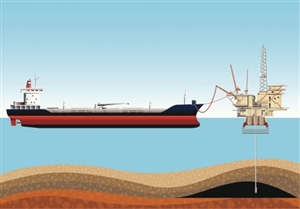Mining the seafloor
East Midlands Local Network
The demand for metals and minerals continues to grow. This is in part thanks to the continued popularity of high-tech consumer devices as well as the expanding renewable energy sector; both large consumers of these materials.

This popularity has necessitated researching alternative means of securing more of these natural resources, and one possible solution has been to mine the deep sea.
Currently most work is focusing on deep-sea exploration and looking to understand what the possible environmental impact of deep-sea mining may be.
“The deep sea is not as well understood as terrestrial mining settings,” explains Dr Henry Ruhl, Associate Head, Ocean Biogeochemistry and Ecosystems at the National Oceanography Centre. “Some minerals are 2,000 metres or more under the sea surface, where it is also much more challenging to collect information and even to make basic objective field observations about industry impact.”
Early exploitation efforts are being planned by organisations such as Nautilus Minerals, which may provide important information on how such an industry could work, including how impact is monitored and managed.
“There is considerable rationale that transparency can help in the sustainable use of natural resources and we are looking to improve transparency for an industry that is in many ways out of sight and out of mind for the general public. There is also scope for considerable engineering and technology development work in this sector.”
Regulation around deep-sea mining is developing; with some regulations in place at a national scale, and the first industrial-scale mineral removal efforts taking place within a few years. “This is when examples of seafloor mining will show if and how it is commercially viable and if it can help meet societal demand for these metals and minerals,” he explains. However, it may be a decade, or possibly longer, until mining removal increases beyond a few frontier projects.”
War gaming supported by cognitive computing and time manipulation
New South Wales (NSW) Local Network
Cognitive intelligence can be defined as when computer software attempts to replicate how a human being would assess a complex situation.
“This is done by exploring a number of different algorithmic approaches to the problem; no longer just a simple calculation with a well-defined answer,” explains Doug Stapleton, Director of Highlands Information Security Pty Ltd. “A foundation of this technology was the grand challenge of having a computer system win the game show Jeopardy!, which IBM finally demonstrated in 2011.”
Cognitive intelligence is becoming increasingly relevant to our everyday lives, appearing in many different sectors such as the armed forces where it is a disruptive new approach to developing training war games. Here it is being used to generate likely scenarios and model adversary behaviour from how they adapt to conditions and events around them.
But it can offer benefits to a lot of different industries, such as healthcare, as Stapleton explains.
“Sectors that have complex situations to evaluate seem to be the first to benefit; probably because that is where people are prepared to invest money for development. Healthcare seems to be out front at the moment.
“There is an image recognition system being combined with cognitive intelligence and machine learning. By taking a photo of a mark on your skin, it will compare against a large database of images that have been evaluated by health professionals and it can make a preliminary diagnosis of the likelihood of it being a skin cancer or not. This is done as a first step screening approach and offers a huge saving in costs and a significant improvement in accuracy.”
If you are interested in these type of subjects then you should attend your IET Local Network's events. They are usually free to attend and you don't have to be a member of the IET - these talks are open to anyone with an interest in engineering and technology and how they will impact all our lives in the future. To find your Local Network please use our interactive map.
